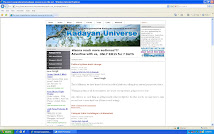
By Tuan Haji Ramlee Dua
The blog administrator wish to extend his sincere gratitude to the author of this article, Tuan Haji Ramlee Dua,for giving the permission to publish “THE KADAYAN DIASPORA - THE MASS MIGRATION INTO LABUAN” in this blog. Tuan Haji Ramli Dua is a regular visitor and he had posted several interesting comments on the articles I've posted in this blog. Readers comments on this article are most welcome. Thank you. - A.S. Kasah, Administrator
Note:
Diaspora - Etymology: Greek, dispersion, from diaspeirein to scatter, from dia- + speirein to sow
In this context it means the movement, migration, or scattering of a people away from an established or ancestral homeland
The Kadayan Diaspora - The Mass Migration Into Labuan
In writing these articles, I am not relying on any references or accurate records, but rather only on my recollections on my readings of history. I most certainly welcome feedbacks from readers in order that we as Kadayans can learn more about ourselves.
The mass migration of Kadayans into Labuan was very recent. I shall dwell on other movements of Kadayans into other parts of what is now Sabah and Sarawak at a later time.
The other reason why I would like to write about the migration of Kadayans into Labuan first is because it was quite straighforward, for Labuan is an island of only some 50,000 acres. Its administrative history, however, is much more interesting and shall be covered in other articles.
The history of all South-East Asian empires, sultanates or states bore one thing in common. This was also common elsewhere where thrones were inherited from kings, sultans, maharajas to less able descendents. The French revolution of 1789 bore testimony to excesses in palaces that led to anger from the masses. The Sultanate of Brunei was not spared this problem.
When James Brooke sailed from Singapore to Borneo in 1838, he landed at Kuching to discover anarchy. The Dayak tribes were revolting against the rule of the Sultan of Brunei over taxes and other serious grievances, not less from uncontrolled piracy and brigandage from other parts of the island, making life difficult for the inhabitants.
Having inherited substantial inheritance from his family and ever the adventurer and opportunist, Brooke immediately saw opportunity from this chaos. He offered to quell the Dayak rebellion and piracy along the coast in return for huge tracts of territory from the Sultan, who saw no loss for as long as he could enjoy his life.
James Brooke used cunning and guile to quell the rebellion and firepower to supress piracy, for he was able to hire English mercenaries with enough guns to fight the pirates. As for the Dayaks, he used a different method. Knowing that they were not necessarily united, he made use of their constant tribal feuds to encourage them to fight each other and to allow more head-hunting as incentives. History will judge that James Brooke, more than the Dayaks themselves, was responsible for blooshed amongst the Dayak tribes until they fought themselves to a standstill.
Having acquired a vast territory known as Sarawak, James Brooke installed himself as Rajah. However, the development of steamships meant the end for sailing ships. This meant coal was in great demand and Sarawak had no coal deposits that could supply ships plying the trade routes from Singapore, Annam, China, Manila and Japan. The island of Labuan was discovered to have a substantial coal deposit that could be commercially developed.
James Brooke demanded that he be given the island on he pretext of giving it to the British Crown due to its strategic location. When Sultan Abdul Momin hesitated, Brooke sent a pompous and crude sea-captain named James Mundy to confront the Sultan and screamed "Bobo chop! Bobo chop!"(Bubuh was the Brunei Malay word meaning to place). The frightened Sultan did as he was ordered and on Christmas Day, 1846, Labuan was declared as a British protectorate and the capital named Victoria.
The following year about 1,000 Kadayans families were encouraged to migrate to Labuan to open up the virgin forests. The reason for this willingness to leave Brunei were several. Firstly, soil which they have been tilling were getting infertile. Brunei proper was never a good place for agriculture because it was either sandy or swampy.
Secondly, the Kadayan population was growing and more land for agriculture was needed.
Thirdly, rule of law was non-existent. Head-hunting by Kayan and Kelabit tribes were causing disproportionate hardships to farmers. Further, bands of profiteers from amongst the Brunei Malay population were making unreasonable demands such as non-payments of produce. Worst of all, daughters were forcibly taken to be sold as concubines either to the Sultan himself of his high-ranking officials.
Moving to Labuan meant freedom from head-hunters, polltaxes, loss of daughters and the prospect of white men as the new masters.
The Kadayans settled all over the island and started new kampungs which stand to this day such as Sungai Lada, Sungai Labu, Sungai Badaun, Bukit Mainding, Batu Manikaa, Kampung Kaasik, Tanjung Puun, Batu Haang, Pulau Buah, Kampung Ancah-Ancah, Bukit Tamiang to name a few. The island came to be known to the Kadayans as Labuhan, meaning a place where ships could drop anchor.
Very few Brunei Malays followed in the footsteps of the Kadayans into Labuan. Those that did settled at kampung Patau-Patau as continued their lives as fishermen. Kadayans who moved into Labuan developed their own methods of in-shore fishing to supplement their needs.
With the cessation of Labuan to the British Crown, a coal mine was opened and Scottish miners were initially brought in as miners. Later, Chinese coolies were sourced from southern China. The mine never made money and was later closed when accident after accident and financial losses could no longer be borne.
Victoria became the centre of commercial activity and many new migrants from China, Malacca and India arrived to start businesses but the Kadayans remained as farmers.....Hj Ramlee Dua



























No comments:
Post a Comment